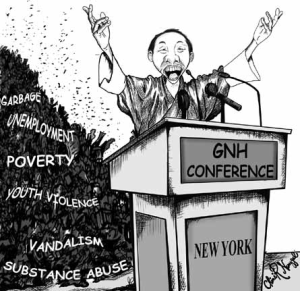The reality of happy
You may see some coverage of a "gross national happiness" summit convened today at the United Nations by Bhutan. (Here's my take on it on Forbes.) The idea is to get world leaders talking about incorporating well-being and principles of sustainability into their way of measuring their nation's progress.)
As always, there's much more to the story. Here's a cartoon from the Bhutan Observer that kind of sums up some of what won't come up today (and shows that the newly granted freedom of the press is flourishing there. That's the prime minister at the podium.) It's the reality of today's Bhutan:

Bhutan Observer
And here's the Opposition Leader of Bhutan speaking about the financial crisis that's gripping the nation right now. He's calling on the government to speak out about it.
What's not discussed is the refugee crisis that's haunted Bhutan for over 20 years. Ironically, part of the reason for Bhutan's expulsion of the Nepalese immigrants long ago was economic: They said keeping health care free, schools free, wasn't possible if they let everyone stay.)
None of this is to taunt Bhutan for its flaws (which we here in the west have in abundance.) Most Bhutanese re-coil at the "happy" and "Shangri-la" things, and despise people like me who use the words even in an ironic context as with my book title. I bring it up to underscore that the precepts of a sustainable economy are more difficult to follow than they are to proclaim.
It's not as simple as "being happy." And it's exciting that there's a dialogue about injecting what matters into the way our leaders think.











